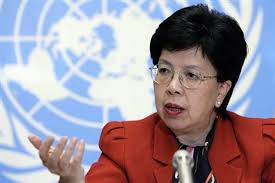By Haruna Gimba
The World Health Organisation (WHO) says Tobacco use kills more than seven million people annually and costs over $1.4 trillion in healthcare expenditure and loss of productivity.
The Director-General of WHO, Dr Margaret Chan, gave the assessment ahead of World No Tobacco Day, marked annually on May 31, which targets the threats tobacco poses to global development worldwide.
The UN health agency warned that tobacco’s killer toxins also wreak havoc on the environment. Stamping out tobacco use can save millions of lives and combat poverty, WHO said, and spotlighted for the first time the ways in which tobacco affects human well-being from an environmental perspective caused by production, distribution and waste.
“Tobacco threatens us all. Tobacco exacerbates poverty, reduces economic productivity, contributes to poor household food choices and pollutes indoor air,” the WHO chief warned.
WHO called on governments to implement strong tobacco control measures such as banning tobacco marketing and advertising, promoting plain product packaging, raising excise taxes and making indoor public places and workplaces smoke-free.
WHO’s Assistant Director-General for Noncommunicable Diseases (NCDs) and Mental Health, Dr Oleg Chestnov, said many governments are taking action against tobacco, from banning advertising and marketing, to introducing plain packaging for tobacco products, and smoke-free work and public places.
For the first time, a WHO report links the impact of tobacco to nature and the environment, pointing out that tobacco waste contains over 7,000 toxic chemicals that poison the environment.
This includes human carcinogens with smoke emissions contributing thousands of tons of human carcinogens, toxicants and greenhouse gases.
Moreover, the report underscores, tobacco waste is the largest type of litter by count globally. “Up to 10 billion of the 15 billion cigarettes sold daily are disposed of in the ecosystem and cigarette butts account for 30 to 40 per cent
of items collected in coastal and urban clean-ups.
“But by taking robust tobacco control measures, governments can safeguard their countries’ future by protecting tobacco users and non-users from these deadly products, generating revenues to fund health and other social services, and saving their environments from the ravages tobacco causes,” Chan stressed.
All countries have committed to eradicate poverty through the 2030 Agenda for Sustainable Development, key elements of which include implementing the WHO Framework Convention on Tobacco Control (FCTC).
By 2030, the Convention and the Global Goals aim to cut premature deaths from Non-communicable diseases (NCDs) by one-third, including those tobacco-related, namely heart and lung diseases, cancer and diabetes.



